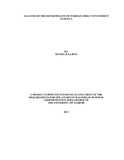| dc.description.abstract | Foreign direct investment (FDI) has been recognized as an important resource for
economic growth and, therefore, economic development. However, this is realized within
a set of variables that determine its inflow into a country. The objective of this study was
to establish the determinants of the flow of foreign direct investment into Kenya. The
study was done using secondary data on exchange rates, taxes, inflation, levels of GDP
and openness for the 21 years from 1991 to 2012.
The study was a multiple linear regression with the annual rate of change in FDI as the
dependent variable and exchange rates, taxes, inflation, levels of GDP and rate of
openness as the independent variables. The results show that the coefficient of annual rate
of change in exchange rates was significant. The coefficient of tax rate was not
significant showing tax rates did not affect FDI rate; the coefficient of GDP growth
(economic growth) was not significant showing GDP growth did not affect FDI. The
coefficient of openness was also not significant indicating that openness did not affect
FDI. The whole regression was statistically significant with an indication that the
variation in the five variables, namely, Exchange Rate, Tax Rate, Inflation, GDP Growth
and Openness explained the variation in the rate of change in FDI.
It is, therefore, concluded that exchange rate is the factor that determines the rate of
change in the FDI inflows into Kenya. Tax Rate, Inflation, GDP Growth and Openness
are not significant drivers of changes in the FDI inflows into Kenya. From the findings it
is recommended that policy maker have to put in place policies to keep the Kenyan
shilling cheaper to attract more FDI. | en |

